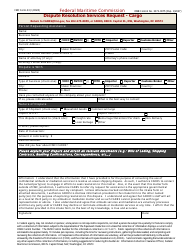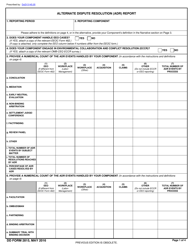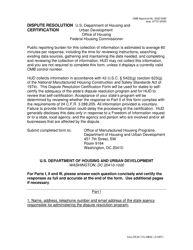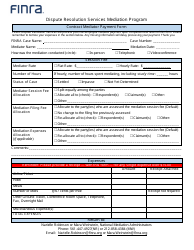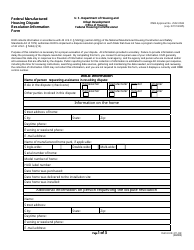Alternative Dispute Resolution Tracking Form
Alternative Dispute Resolution Tracking Form is a 2-page legal document that was released by the United States District Court on December 1, 2019 and used nation-wide.
FAQ
Q: What is the Alternative Dispute Resolution Tracking Form?
A: The Alternative Dispute Resolution Tracking Form is a document used to track information related to alternative dispute resolution processes.
Q: What is alternative dispute resolution?
A: Alternative dispute resolution refers to processes and techniques used to resolve disputes outside of traditional court litigation, such as through mediation or arbitration.
Q: Why is the Alternative Dispute Resolution Tracking Form used?
A: The form is used to keep a record of alternative dispute resolution cases, including details such as the names of the parties involved, the nature of the dispute, and the outcome of the process.
Q: Who uses the Alternative Dispute Resolution Tracking Form?
A: The form is typically used by organizations or entities that offer alternative dispute resolution services, such as law firms or mediation centers.
Q: What information is recorded in the form?
A: The form records information such as the names of the parties involved, the date and location of the dispute resolution process, the type of process used (e.g., mediation or arbitration), and the outcome or resolution of the case.
Q: Is the Alternative Dispute Resolution Tracking Form legally binding?
A: The form itself is not legally binding, but it is important for maintaining records of alternative dispute resolution cases and can be used as supporting evidence in legal proceedings if necessary.
Q: Can individuals use the Alternative Dispute Resolution Tracking Form?
A: While the form is primarily used by organizations or entities that offer dispute resolution services, individuals can use a similar form or template to track their own alternative dispute resolution cases if desired.
Q: Are there any fees associated with using alternative dispute resolution?
A: The fees associated with alternative dispute resolution can vary depending on the specific process and the organization or mediator involved. Some processes may be free, while others may require payment of fees.
Q: What are the advantages of alternative dispute resolution?
A: Alternative dispute resolution can be quicker, less expensive, and more flexible than traditional court litigation. It also allows parties to have more control over the outcome and can help preserve relationships between parties.
Q: Are the outcomes of alternative dispute resolution legally enforceable?
A: In many cases, the outcomes of alternative dispute resolution processes, such as mediated settlements or arbitration awards, can be legally enforceable. However, this depends on the specific agreements reached and the laws of the jurisdiction.
Form Details:
- The latest edition currently provided by the United States District Court;
- Ready to use and print;
- Easy to customize;
- Compatible with most PDF-viewing applications;
- Fill out the form in our online filing application.
Download a fillable version of the form by clicking the link below or browse more legal forms and templates provided by the issuing department.




